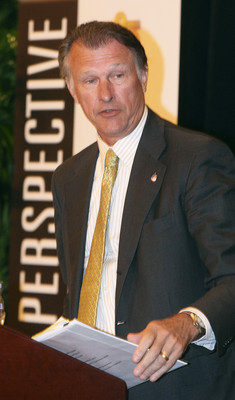Perspective forum offers differing views on health of local economy
Pessimists look at Southern Nevada's economy and see double-digit unemployment, declining visitor volume and gaming revenue, the highest foreclosure rate in the nation, and casino companies struggling to pay debt on multi billion-dollar Strip projects.
Optimists see economic diversification that has reduced the percentage of workers in tourism and hospitality from 27 percent to 18 percent. They note that 75 out of 76 homeowners are current on their mortgages, that Nevada is ranked No. 3 in the nation for its tax climate -- behind Wyoming and South Dakota -- and that the average daily temperature is 70 degrees.
It's a matter of viewing the glass as half full or half empty, Jeremy Aguero said Wednesday at 2009 Las Vegas Perspective, an annual economic forum sponsored in part by the Review-Journal.
"I'm feeling a little woozy today," the principal of Applied Analysis research firm said at the start of his hour-long presentation. "I walked outside this morning and got hit by a big piece of falling sky."
About 600 community and business leaders attended the event at Renaissance Las Vegas, competing for parking spaces with 40,000 people going to the International Wireless CTIA show at the nearby Las Vegas Convention Center.
"Let's start with the glass half empty," Aguero said when he put up the negative numbers.
Population growth was down 0.5 percent in 2008. Some 41,400 jobs were lost, including 14,300 jobs in the region's core industry of hospitality and gaming. Home prices have plummeted from their peak of $313,000 in October 2006 to $154,000 in February. The average price for an acre of vacant land has taken the same tumble, from $810,000 in second quarter 2006 to $392,000 in the most recent quarter.
The bears will focus on the long-term debt of casino companies, the inability to refinance debt and the huge crisis facing Las Vegas' largest industry, Aguero said.
They're going to point to the 2.1 million fewer annual visitors, who spend an average of $715 on each trip to Las Vegas. That's $1.5 billion lost from the economy, he said.
On the positive side, interest rates are below 5 percent and affordability has returned to the housing market. Though down from previous years, gross gaming revenue was $778 million in January, a terrible month for tourism, Aguero said.
The vast majority of 231,000 new jobs created in Las Vegas over the past 10 years came from business expansion and not from the casinos. Government, education and health services actually posted positive job growth last year. And with 330 baby boomers turning 60 every hour, Las Vegas continues to see an influx of retirees.
Nearly 20 percent of people living in Las Vegas said they were transferred for a job and 14.3 percent said they came here to find a job. And 7.4 percent moved here to retire.
"People who see the glass as half full are going to remind us that even though population has declined over the last 12 months, that 64,700 people still thought enough of our community to turn in their out-of-state driver's licenses to the DMV," Aguero said. "People are still voting with their feet to come to Southern Nevada. Maybe they looked at all their options and they see the grass is greener on the other side."
Dick Kovacevich, chairman of Wells Fargo & Co., another sponsor of Las Vegas Perspective, took a swipe at President Barack Obama for comments he made about banks receiving government bailout money and then scheduling meetings in Las Vegas. As a result, more than 300 meetings have been canceled, costing Las Vegas nearly $300 million in convention business.
"You can't have it both ways. You can't try to stimulate the economy and create jobs and then discourage traveling," Kovacevich said.
These so-called "recognition events" make people more productive and that's why Wells Fargo remains profitable, he said. Also, they're paid for with the bank's profits, not government funds.
Kovacevich said the subprime mortgage crisis might have been avoided if rating agencies had done their jobs and mortgage companies managed risk better.
Wells Fargo's top executive said banks can only do what investors allow or what the government allows. TARP (Troubled Asset Relief Program) funds have helped banks be more liquid with their assets, but the stimulus package means more to other industries than it does to banks, Kovacevich said.
Contact reporter Hubble Smith at hsmith@reviewjournal.com or 702-383-0491.

















